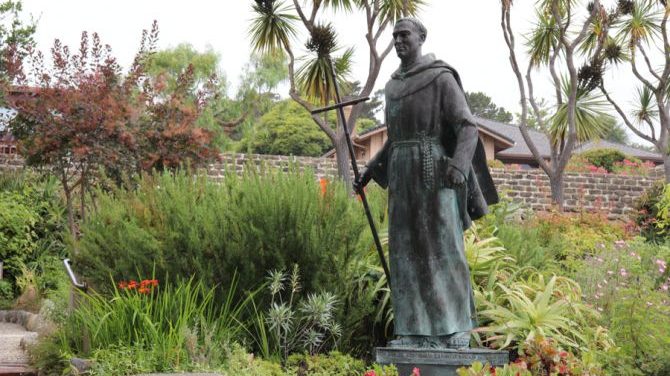While Catholic leaders have made strong defenses of St. Junípero Serra after a wave of vandalism and crime targeted Catholic statues and churches last year, political leaders in California continue to remove markers of the missionary whom Pope Francis canonized as the first Hispanic American saint.
Los Angeles Mayor Eric Garcetti announced Oct. 11 that the city would no longer call the park across from Union Station by its informal name, Father Junípero Serra Park. A statue of Serra had been in the park from the 1930s until 2020, when protesters toppled it amid racial tensions and claims the saint, who died in 1784, was involved in injustices of the Spanish colonial period. The park will be called La Plaza Park until a new name is adopted.
The park is walking distance from La Placita, the Church of Our Lady Queen of Angels, the city’s oldest Catholic church, which has elements dating back at least to 1814. Serra did not have personal links to the key landmark
“We all share the same mission, the mission that brought St. Junípero Serra to California — to share the good news of God’s love and to witness to his love through our actions!” Archbishop Jose Gomez of Los Angeles had said on Twitter Oct. 15, showing a historic drawing portraying friars baptizing an indigenous baby.
In a Sept. 12 essay, Gomez joined San Francisco Archbishop Salvatore Cordileone to criticize the “outrageous claim” about Serra and the mission system he founded.
“As leaders of the state’s two largest Catholic communities, we serve thousands of native Californians who trace their faith to ancestors who helped build the missions,” they said. “We understand the bitter history of native exploitation. But history can be complicated and facts matter.”
They said Serra was a “complex character” who “defended indigenous people’s humanity, decried the abuse of indigenous women, and argued against imposing the death penalty on natives who had burned down a mission and murdered one of his friends.”
Even though aged and infirm, Serra had traveled 2,000 miles to Mexico City “to demand that authorities adopt a native bill of rights he had written,” they said.
Mayor Garcetti announced the change to honor Indigenous Peoples Day.
“Los Angeles is a city of belonging that takes responsibility for the mistakes we’ve made in the past,” he said in an Oct. 11 statement. “Our indigenous brothers and sisters deserve justice and today we take a step toward delivering both greater cultural sensitivity and spaces for Angelenos to gather and perform their traditional ceremonies.”
“This is not about tearing down or erecting statues. This is about telling the complicated truth of history,” he said, according to KABC News.
Garcetti spoke at an event with members of indigenous Californians from the Gabrielino/Tongva and Fernandeño Tataviam tribes.
“The buildings that are here were built on the slave labor of native inhabitants. And we’re sorry,” Garcetti continued. “We’re sorry as a city for all the things that were done as a Spanish city, a Mexico city, an American city to erase the peoples whose land this is and always will be.”
Garcetti said the city plans to issue a formal apology, give Native Americans priority access to the park, and work to determine what lands should be given to them.
The Los Angeles mayor’s Civic Memory Working Group released an April 2021 report on engagement with the past. It does not mention Serra or Catholicism specifically. It acknowledges the “history of erasure of the Indigenous people of Los Angeles,” endorses statements of apology or reconciliation, and recommends “clear practices to ameliorate and/or decolonize the practices of erasure and exclusion.”
Also speaking last Monday was Councilman Mitch O’Farrell, a member of the Oklahoma-based Wyandotte Nation, a federally recognized tribe. O’Farrell’s remarks were explicitly critical of Serra.
“Places like Serra Park, named after Junípero Serra who in this region led local subjugation and conversion efforts on behalf of the Catholic Church, are a powerful symbol of past wrongs," O’Farrell said, according to KABC News.
Archbishops Gomez and Salvatore explicitly criticized a California bill’s claim that Serra oversaw a mission system that included “enslavement of both adults and children, mutilation, genocide, and assault on women.”
“While there is much to criticize from this period, no serious historian has ever made such outrageous claims about Serra or the mission system, the network of 21 communities that Franciscans established along the California coast to evangelize native people,” they said in their essay, contending lawmakers base their claims on a single tendentious source, a book by journalist Elias Castillo.
CNA sought comment from the Los Angeles archdiocese but did not receive a response by deadline.

